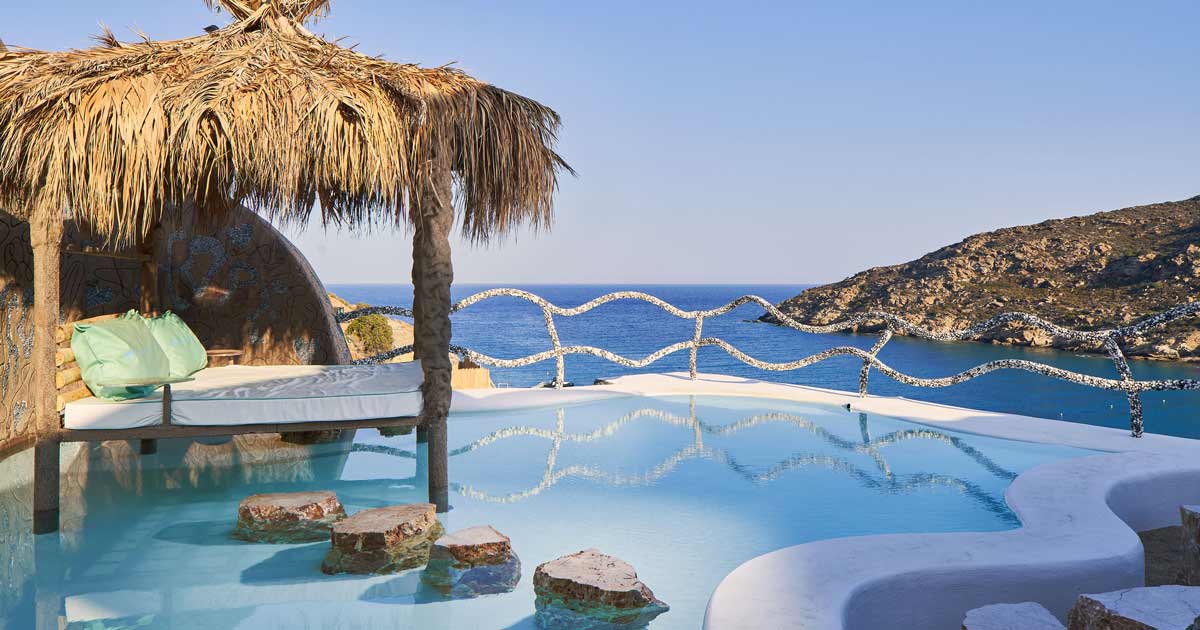
Most building developers try to maximize their profits by developing all their owned land. But Angelos Michalopoulos and his wife, Vassiliki Petridou, are opting for the opposite approach. They are choosing to build on only 1% of the land they own so they can afford to preserve the rest of it.
As Greek natives, they grew up with an appreciation for nature. Michalopoulos was raised in Athens. His father was a landscape architect who inspired him to love the environment. “Nature is truth. Nature doesn’t lie like people do. And that’s why we tend to feel very comfortable with nature, because it gives us a linearity and it grounds us,” Michalopoulos explains. “Greece is a country that has almost an innate love of the environment.”
Petridou shares her husband’s views about nature and had a similar upbringing. “Our generation here in Greece, as children, [we] spend a lot of time outside, playing soccer on the grass and running around in open spaces. It was a childhood that was very connected to nature,” she says.
Michalopoulos and Petridou’s story starts with love—of Greece and family
Michalopoulos and Petridou first met in 1983 while attending Cornell University in New York. They married in 1987 during a civil ceremony and then had a traditional ceremony in Athens. The couple welcomed triplets in 1994 and twins in 1998 while living on the Upper West Side of New York City. During a family vacation to the island of Ios in Greece, they decided to embark on what Michalopoulos refers to as an experiment with owning and preserving land.
He explains that there are three different ways to manage land you own. The first way is to leave it untouched and do nothing. “And then just wait for everything to economically self-destruct until the generation after the [next] generation decides that this idea has not worked well,” he says.
The second option is to do the opposite—build on all the land that you own. He offers an example of how this has happened in other parts of Greece. “The way of Mykonos and Santorini, which [are] overdeveloped and have the profit maximization as the flag and the ethos of the whole experiment,” he explains.
Their passion project: Preserving 99% of their land
The last option is the one that Michalopoulos and Petridou chose with their land. “We propose a way where we will develop 1% of our area and then leave 99% untouched,” he says. “We felt that was the only way that we can give to our children,” he says. On that 1% of land, they own two resorts—Calilo on the beachside and Agalia on the portside.
Michalopoulos explains that he hasn’t left the entire land untouched because he’s using the money earned from the resorts to maintain the preserved land and pay the taxes on it. “This has to be economically sustainable. If it’s not sustainable economically, no generation… will ever support this venture,” he says. “We need to make sure that not only in our lifetime, but also the lifetime of our children and then onwards, this plan, this experiment—because it is an experiment—will succeed, and the only way to do that is to be financially viable.”
In 2004, the couple began purchasing land before opening Agalia hotel and Calilo resort in 2016 and 2019, respectively. Michalopoulos and Petridou now own a quarter of Ios island and credit their profitability to developing only a small portion of land over an extended period of time.
Besides needing to be economically sustainable with their land, they opened the resorts so people could appreciate the beauty in Ios. “The whole project is also a very active project of hospitality—to be able to share this island that we fell in love with, with other people,” Petridou says.
What makes Calilo and Agalia luxury hotels so special
Certain people make the island especially meaningful: Three of the couple’s five children currently work there. They try to maintain healthy relationships by keeping work separate from family time. “You put this into compartments,” Michalopoulos says. “We put limits on the actual time you [discuss business] and then you can enjoy the family business.”
When they do talk business, a major focus is the brand’s commitment to sustainability. The hotels take an eco-friendly approach with waste management, power lines and water collection. LuxurIOS, the duo’s hospitality company, which manages Calilo, promotes sustainable tourism in Greece.
“Sustainability is the only solution to the overdevelopment of the other islands,” Michalopoulos says. The websites for Calilo and LuxurIOS both describe Michalopoulos and Petridou’s detailed vision for how they plan to preserve the island.
Michalopoulos explains that “People monetize beauty.” He says that it’s understandable why they do so, but it’s important to not overdo it.
“The big lesson that the last 100 years have taught us is that nobody demolishes buildings,” he says. “We just keep on building and building and building, which means that once we make them, once we build them, they’re there, and they become part of a problem instead of part of the solution.”
Michalopoulos and Petridou’s secret? Loving their land
Although he firmly believes in his experiment of preserving the land he owns, he’s not suggesting all builders follow suit. “Every person is responsible for their own ethos and for their own principles,” he says. “I don’t want to export my way of thinking to another person who sleeps every night with a conscience. For me, this is the right thing to do.”
Petridou also points out that many large building developers don’t have any connection to the land they are developing. “They don’t quite feel what exactly is happening by taking over something beautiful and creating it as another cash machine,” she says. “There’s no one that actually cares about what’s happening on the island and the series of villages. I think they’re a bit disconnected.”
There are many reasons Michalopoulos and Petridou love their island. “It has really an innocence. The moment you step foot, you belong,” Petridou says. She explains that most hotels recreate what people have already experienced before. But when you visit their island, she says you can experience an authenticity that embraces everyone. “We opened the door for people to come in. And it’s a very, very welcoming island.”
Photo courtesy of LuxurIOS.




